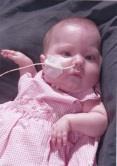NHS England appears to have ruled itself out of direct involvement in patient care investigations after refusing to join the Care Quality Commission in a probe into the death of a baby girl.
In a policy line direct from chief executive Simon Stevens, NHS England yesterday declared it is “not and has never been an investigatory body”. This comes despite the body possessing the power to investigate patient care in its role as a commissioner.
The commissioning body issued the line after it emerged the CQC had signalled its intention to launch an investigation into the death of a baby girl with the close involvement of NHS England.
- DH weighs into baby death probe
- Leader: We need sustainable solutions to care failure investigations
NHS England’s national director of patient safety Mike Durkin had “worked closely” with the CQC as the watchdog developed an approach to the investigation, NHS England confirmed.

Elizabeth Dixon died at Frimley Park Hospital in December 2001. Her parents Graeme and Anne have fought a long running battle to have her death investigated.
In June this year the family received an email from the CQC which spoke of setting up “an independent and rigorous investigation into Elizabeth’s tragic path from birth to death”. It added: “We are proposing that we will, in partnership with NHS England, jointly establish an investigation panel.”
Referring to a planned meeting with the family, the email said: “The individuals you will meet are amongst the most senior in NHS England and here at CQC.”
The email said Dr Durkin would be at the meeting. He was also copied into the message.
On 4 July the Dixon family received another email which said the CQC’s desire to “sit down together and scope up with my colleagues in NHS England, just what we can collectively best achieve”.
However, on 1 August NHS England informed the CQC it would not be involved in the joint commissioning of the investigation panel and that Dr Durkin would not be attending the meeting with the family due to take place on the following Monday.
In response to HSJ’s inquiries, the CQC said it had been “discussing carrying out a joint piece of work with NHS England but this has not been possible”.
A CQC spokesman said that while it would no longer investigate the “issues raised by the sad death of Elizabeth”, it would use her case as the starting point for a thematic review which would involve “an examination of failures from which wider system learning and improvement can be drawn”.
A spokesperson for NHS England said: “NHS England is not, and has never been an investigatory body.
“We strongly support the independent CQC investigation to ensure the facts and lessons are learned from this tragic case.”
An earlier statement said: “Mike Durkin has worked closely with CQC to develop a response to the families concerns. Unfortunately he was not able to attend the meeting on [4 August].
“This could not be avoided and he remains very concerned if he inadvertently caused any distress to the Dixons and has apologised to the family. That is the last thing he would have wanted.”
As the inheritor of the responsibilities of previous commissioning organisations and as a commissioner itself, NHS England has the power to undertake investigations.
However, it now keen to stress that the responsibility of dealing with individual patient complaints lies with the healthcare provider in the first place and, then, the Parliamentary Health Service Ombudsman.
Since joining NHS England in April, Mr Stevens has been at pains to focus the organisation on its core commissioning remit. For example, an internal review of NHS England’s functions resulted in a decision to ask the CQC to take on its patient safety role.
The Parliamentary Health Ombudsman told HSJ it was aware of Elizabeth’s case but that it could only investigate cases within 12 months of the “events complained about”.
Mr and Ms Dixon told HSJ they were “devastated” by NHS England’s decision.
“NHS England has prevented the investigation from going ahead and the CQC do not have the powers to investigate Elizabeth’s individual case,” they said. “Here is revealed the real problem with the NHS and regulation; they all hide behind their lack of remit by design.”
Elizabeth suffocated to death at home just days before her first birthday after a newly qualified nurse failed to keep her breathing tube clear. The nurse was later struck off by the Nursing and Midwifery Council for failures related to Elizabeth’s care.
The baby had previously suffered brain damage after staff at Frimley Park Hospital failed to check or treat her “dramatically high pressure”, according to an independent report into her hospital care published in 2013. The report concluded it was “overwhelmingly likely” that high blood pressure caused brain damage that led “ultimately to her early death”.



























10 Readers' comments